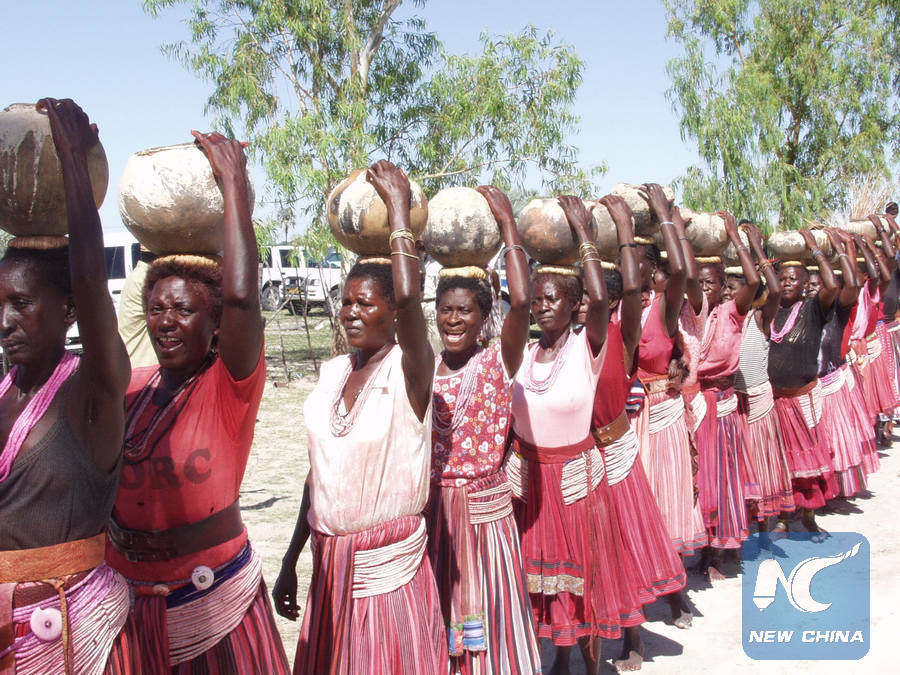
Local women carry clay-pots filled with Omagongo (marula juice) in Windhoek, Namibia, Dec. 3, 2015. (Xinhua/Nampa)
WINDHOEK, Feb. 27 (Xinhua) -- In Namibia's northern Omusati region, Esra Kuutumbeni toils on her pearl millet field as she hopes for improved yields of the staple crop, following a dry spell the preceding year.
"I wake up early to work on my field to ensure that weeds do not outgrow my crops. I want to be food sufficient, sell surplus and be an independent woman," she said.
Kuutumbeni has been farming on this land for nearly 20 years, but has only owned full access to the land since late 2005.
When Kuutumbeni's husband died in 2004, she nearly lost her farming land to male relatives. "My elderly son was already married. Traditionally, when my husband passes on and son is married, an elderly uncle was supposed to take over his land and I shall go back to my mother's household," Kuutumbeni said.
She was saved from her ordeal when she heard of the enactment of the Communal Land Reform Act by the Namibian government in 2002 that allows ownership for agricultural land by women.
"Although my male counterparts had instigated a fight against me owning their "ancestral land" as they claimed at the time, I learned on radio of this new Act that protects women. As luck would have it for me, the traditional authority was aware of the Act, defended my case and that's how I now have land to farm on," she shared on Monday.
Cases like that of Kuutumbeni are not unique to Namibia. Traditionally, women in Africa had been barred from owning land they tirelessly work on.
To deliberate on this social challenge, government officials from Sub-Saharan countries gathered at conference on land ownership rights under the theme of One world, no hunger, strengthening women's land ownership rights in sub-Saharan Africa, recently held in Namibian capital, Windhoek.
The land tenure and land ownership rights for women conference looked at how to enhance land rights for women in Sub-Saharan Africa.
According to Priscilla Boois, Deputy Minister of Land Reform, ownership of land remains an elusive dream for the majority women in Sub-Sahara as customary laws and land tenure in most African countries makes it difficult for woman to own land despite their hard work on such lands.
"Traditionally, women were seen to live through their male relatives or spouses. Widows had no secured rights to remain on communal homes and land but to apply for re-allocation to the traditional authority at a fee," Boois said during the conference.
In the case of Namibia, this has improved since independence and more women own land.
Meanwhile, in Namibia, of the 70 percent country's population depending agricultural land for livelihood, women account for 59 percent of people engaged in skilled and subsistence agriculture according to national statistics.
This shows the central role played by women in agriculture and thus the importance of securing land rights for women through policies and good governance, argued Louise Shixwameni, Director in the Office of the Prime Minister.
She called on policy makers to ensure harmony of laws and legal provisions on land access and ownership rights, especially for women.
"What women need are basic rights to be entrenched in the constitution and for equal rights of property ownership to be clearly stipulated in the law. It's not about saying that men and women have equal access; they need to be entrenched in the law, distinctly. It is therefore necessary for countries in Sub-Sahara like Malawi and Mozambique to bring all inheritance and land laws in harmony with the constitution," Shixwameni said.
According to the Director, it is through harmonized policies that would ease the burden of women, and enable them women like Kuutumbeni to build sustainable lives. Evidently, unlike many women who lost and rights to male relatives before the enactment of the Act in 2002, Kuutumbeni could retain her land rights in accordance with the Act.
In the interim, while the conference delegates seek for amicable solutions, Kuutumbeni is glad that women have access to land.
"I wouldn't know how I could have been able to enhance my livelihood without land. Now that I am given a chance to my own land, I even earn an income from my surplus. That's the greatest empowerment that the Communal Land Reform Act gives to women," she said as she continues to toil on her land.

